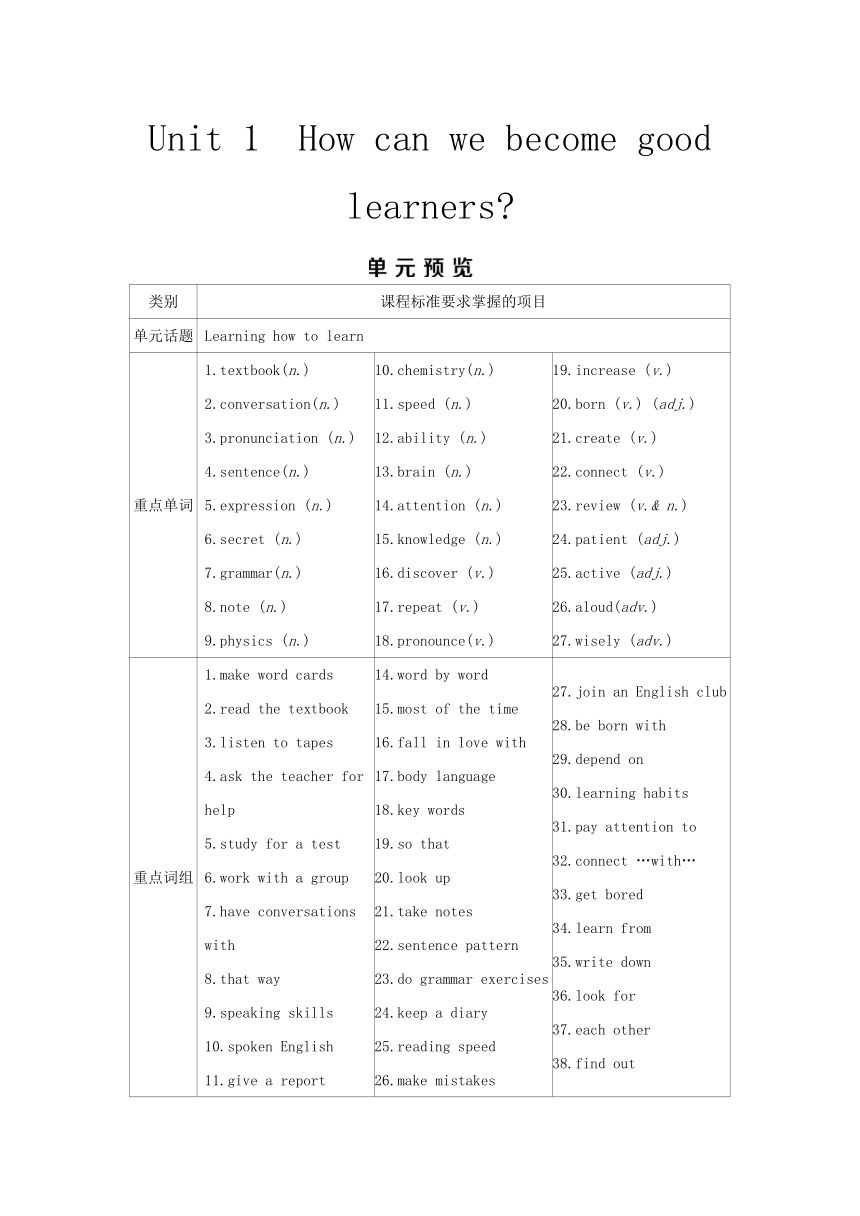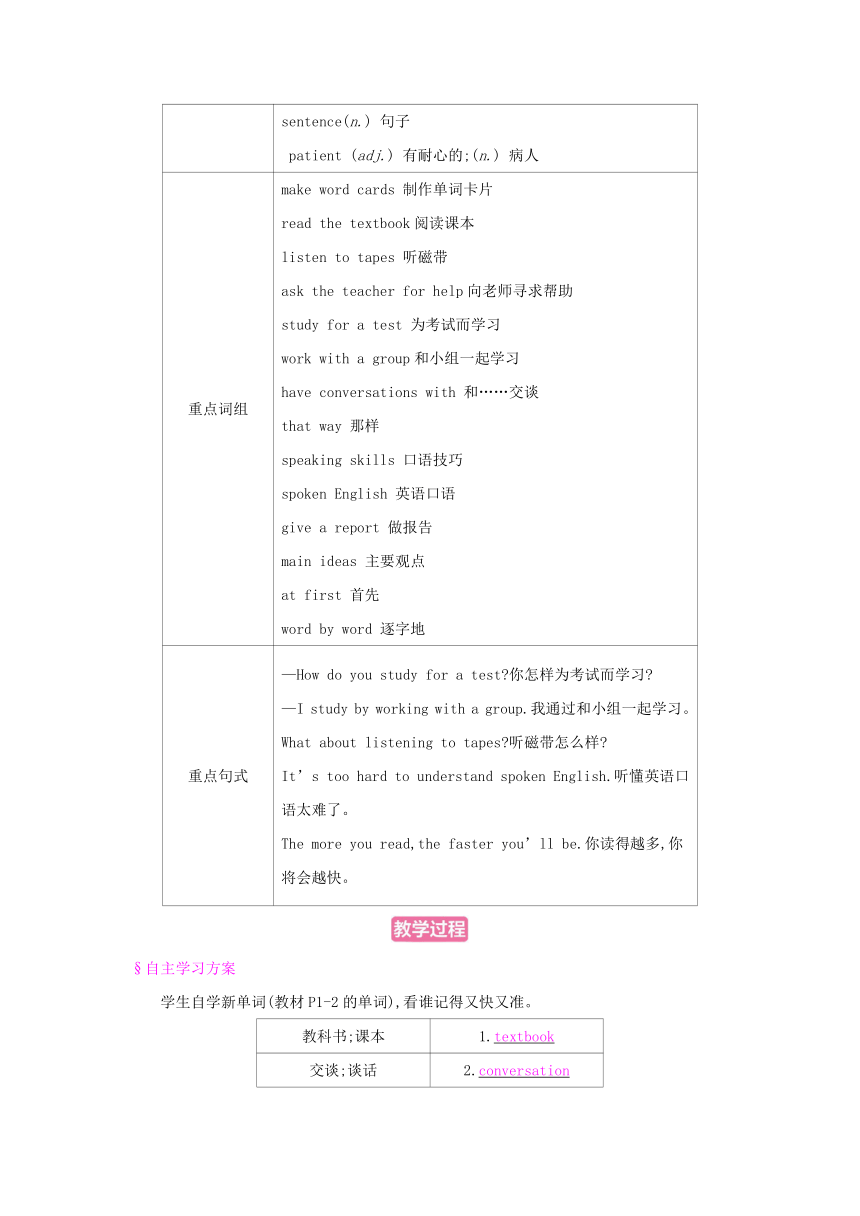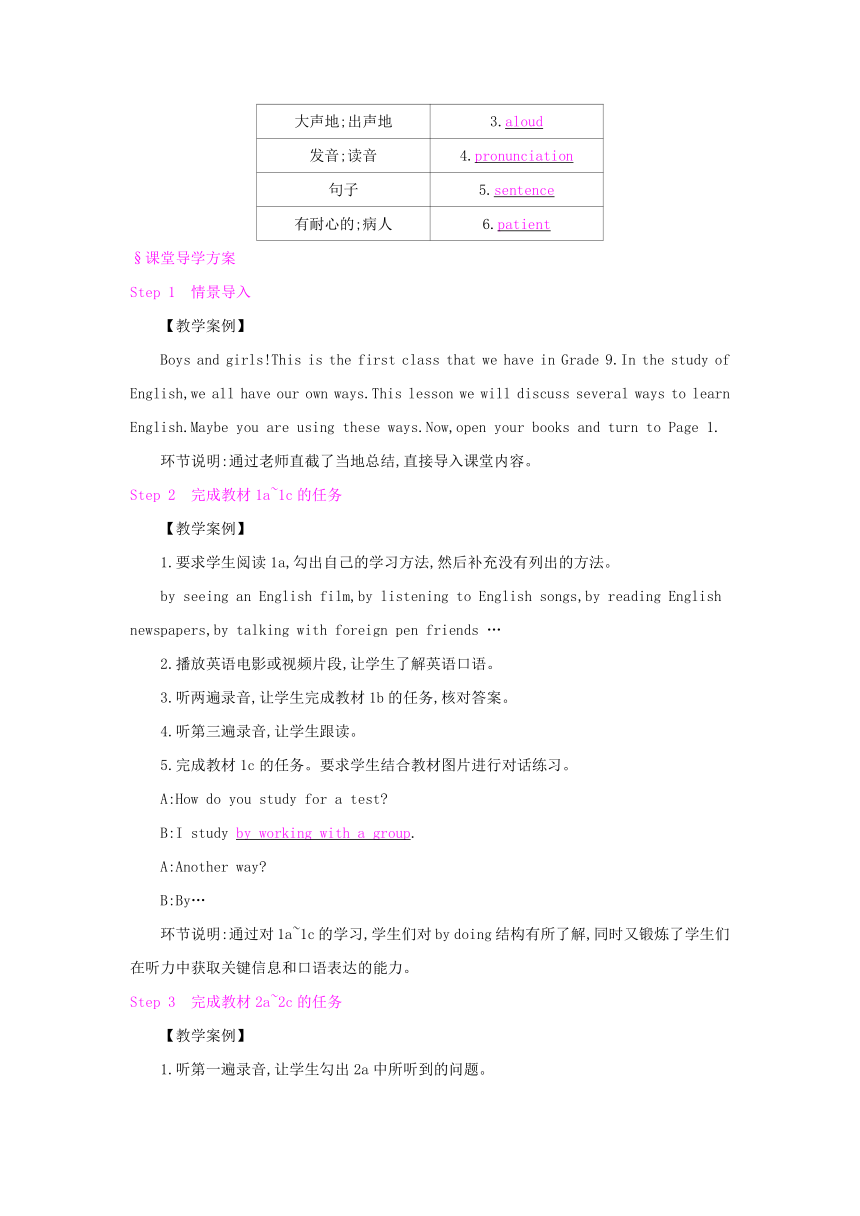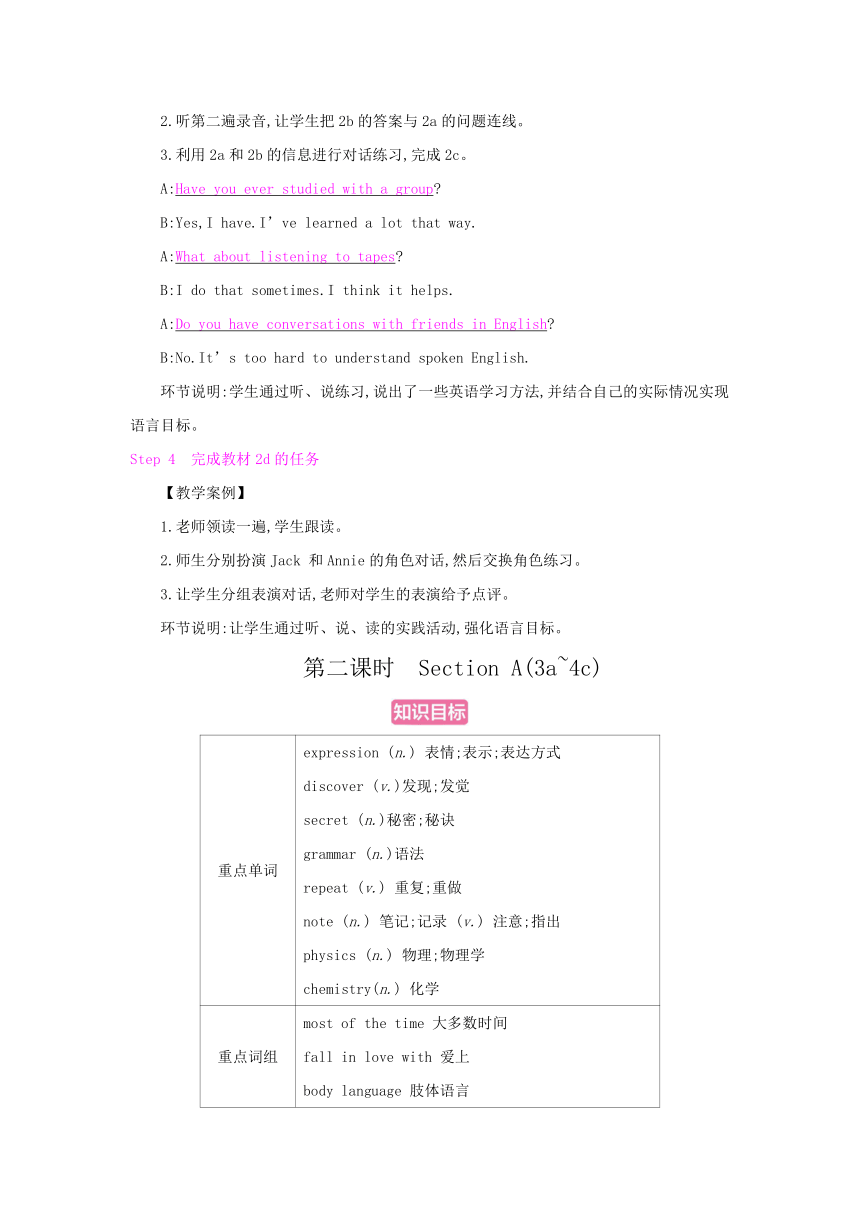Unit 1 How can we become good learners 单元教学案(4课时)
文档属性
| 名称 | Unit 1 How can we become good learners 单元教学案(4课时) |  | |
| 格式 | docx | ||
| 文件大小 | 86.4KB | ||
| 资源类型 | 教案 | ||
| 版本资源 | 人教新目标(Go for it)版 | ||
| 科目 | 英语 | ||
| 更新时间 | 2021-09-11 13:19:59 | ||
图片预览





文档简介
Unit
1
How
can
we
become
good
learners?
类别
课程标准要求掌握的项目
单元话题
Learning
how
to
learn
重点单词
1.textbook(n.)
2.conversation(n.)
3.pronunciation
(n.)
4.sentence(n.)
5.expression
(n.)
6.secret
(n.)
7.grammar(n.)
8.note
(n.)
9.physics
(n.)
10.chemistry(n.)
11.speed
(n.)
12.ability
(n.)
13.brain
(n.)
14.attention
(n.)
15.knowledge
(n.)
16.discover
(v.)
17.repeat
(v.)
18.pronounce(v.)
19.increase
(v.)
20.born
(v.)
(adj.)
21.create
(v.)
22.connect
(v.)
23.review
(v.&
n.)
24.patient
(adj.)
25.active
(adj.)
26.aloud(adv.)
27.wisely
(adv.)
重点词组
1.make
word
cards
2.read
the
textbook
3.listen
to
tapes
4.ask
the
teacher
for
help
5.study
for
a
test
6.work
with
a
group
7.have
conversations
with
8.that
way
9.speaking
skills
10.spoken
English
11.give
a
report
12.main
ideas
13.at
first
14.word
by
word
15.most
of
the
time
16.fall
in
love
with
17.body
language
18.key
words
19.so
that
20.look
up
21.take
notes
22.sentence
pattern
23.do
grammar
exercises
24.keep
a
diary
25.reading
speed
26.make
mistakes
27.join
an
English
club
28.be
born
with
29.depend
on
30.learning
habits
31.pay
attention
to
32.connect
…with…
33.get
bored
34.learn
from
35.write
down
36.look
for
37.each
other
38.find
out
重点句式
1.—How
do
you
study
for
a
test?—I
study
by
working
with
a
group.
2.What
about
listening
to
tapes?
3.It’s
too
hard
to
understand
spoken
English.
4.The
more
you
read,the
faster
you’ll
be.
5.I
was
afraid
to
ask
questions
because
of
my
poor
pronunciation.
6.I
discovered
that
listening
to
something
interesting
is
the
secret
to
language
learning.
7.I
don’t
know
how
to
increase
my
reading
speed.
8.I
don’t
have
a
partner
to
practice
English
with.
9.But
whether
or
not
you
can
do
this
well
depends
on
your
learning
habits.
10.Studies
show
that
if
you
are
interested
in
something,your
brain
is
more
active.
11.Good
learners
think
about
what
they
are
good
at.
12.They
are
not
afraid
of
making
mistakes.
13.It
is
not
enough
to
just
study
hard.
14.They
also
look
for
ways
to
review
what
they
have
learned.
15.Good
learners
often
ask
questions
during
or
after
class.
16.Learning
is
a
lifelong
journey
because
every
day
brings
something
new.
单元语法
verb
+
by
doing
sth.
第一课时 Section
A(1a~2d)
重点单词
textbook(n.)
教科书;课本
conversation(n.)交谈;谈话
aloud(adv.)
大声地;出声地
pronunciation
(n.)发音;读音
sentence(n.)
句子
patient
(adj.)
有耐心的;(n.)
病人
重点词组
make
word
cards
制作单词卡片
read
the
textbook阅读课本
listen
to
tapes
听磁带
ask
the
teacher
for
help向老师寻求帮助
study
for
a
test
为考试而学习
work
with
a
group和小组一起学习
have
conversations
with
和……交谈
that
way
那样
speaking
skills
口语技巧
spoken
English
英语口语
give
a
report
做报告
main
ideas
主要观点
at
first
首先
word
by
word
逐字地
重点句式
—How
do
you
study
for
a
test?你怎样为考试而学习?
—I
study
by
working
with
a
group.我通过和小组一起学习。
What
about
listening
to
tapes?听磁带怎么样?
It’s
too
hard
to
understand
spoken
English.听懂英语口语太难了。
The
more
you
read,the
faster
you’ll
be.你读得越多,你将会越快。
§自主学习方案
学生自学新单词(教材P1-2的单词),看谁记得又快又准。
教科书;课本
1.textbook
交谈;谈话
2.conversation
大声地;出声地
3.aloud
发音;读音
4.pronunciation
句子
5.sentence
有耐心的;病人
6.patient
§课堂导学方案
Step
1 情景导入
【教学案例】
Boys
and
girls!This
is
the
first
class
that
we
have
in
Grade
9.In
the
study
of
English,we
all
have
our
own
ways.This
lesson
we
will
discuss
several
ways
to
learn
English.Maybe
you
are
using
these
ways.Now,open
your
books
and
turn
to
Page
1.
环节说明:通过老师直截了当地总结,直接导入课堂内容。
Step
2 完成教材1a~1c的任务
【教学案例】
1.要求学生阅读1a,勾出自己的学习方法,然后补充没有列出的方法。
by
seeing
an
English
film,by
listening
to
English
songs,by
reading
English
newspapers,by
talking
with
foreign
pen
friends
…
2.播放英语电影或视频片段,让学生了解英语口语。
3.听两遍录音,让学生完成教材1b的任务,核对答案。
4.听第三遍录音,让学生跟读。
5.完成教材1c的任务。要求学生结合教材图片进行对话练习。
A:How
do
you
study
for
a
test?
B:I
study
by
working
with
a
group.?
A:Another
way?
B:By…
环节说明:通过对1a~1c的学习,学生们对by
doing结构有所了解,同时又锻炼了学生们在听力中获取关键信息和口语表达的能力。
Step
3 完成教材2a~2c的任务
【教学案例】
1.听第一遍录音,让学生勾出2a中所听到的问题。
2.听第二遍录音,让学生把2b的答案与2a的问题连线。
3.利用2a和2b的信息进行对话练习,完成2c。
A:Have
you
ever
studied
with
a
group??
B:Yes,I
have.I’ve
learned
a
lot
that
way.
A:What
about
listening
to
tapes??
B:I
do
that
sometimes.I
think
it
helps.
A:Do
you
have
conversations
with
friends
in
English??
B:No.It’s
too
hard
to
understand
spoken
English.
环节说明:学生通过听、说练习,说出了一些英语学习方法,并结合自己的实际情况实现语言目标。
Step
4 完成教材2d的任务
【教学案例】
1.老师领读一遍,学生跟读。
2.师生分别扮演Jack
和Annie的角色对话,然后交换角色练习。
3.让学生分组表演对话,老师对学生的表演给予点评。
环节说明:让学生通过听、说、读的实践活动,强化语言目标。
第二课时 Section
A(3a~4c)
重点单词
expression
(n.)
表情;表示;表达方式
discover
(v.)发现;发觉
secret
(n.)秘密;秘诀
grammar
(n.)语法
repeat
(v.)
重复;重做
note
(n.)
笔记;记录
(v.)
注意;指出
physics
(n.)
物理;物理学
chemistry(n.)
化学
重点词组
most
of
the
time
大多数时间
fall
in
love
with
爱上
body
language
肢体语言
key
words
关键词
so
that为的是
get
the
meaning理解意思
look
up
查询
take
notes记笔记
sentence
pattern句型
do
grammar
exercises
做语法练习
keep
a
diary
记日记
重点句式
I
was
afraid
to
ask
questions
because
of
my
poor
pronunciation.因为我不熟练的发音,我害怕问问题。
I
discovered
that
listening
to
something
interesting
is
the
secret
to
language
learning.我发现听有趣的事是语言学习的秘诀。
Do
you
learn
English
by
doing
grammar
exercises?你学英语是通过做语法练习吗?
§自主学习方案
学生自学新单词(教材P3-4的单词),看谁记得又快又准。
发现;发觉
1.discover
秘密;秘诀
2.secret
语法
3.grammar
重复;重做
4.repeat
笔记;记录;注意;指出
5.note
物理;物理学
6.physics
化学
7.chemistry
§课堂导学方案
Step
1 情景导入
【教学案例】
This
class
we’ll
learn
3a
to
4c.First,please
answer
my
questions.
1.Do
you
think
English
is
hard
to
learn?
2.What
is
the
most
difficult
part?
3.How
do
you
study
English?
环节说明:通过师生之间的问答,导入课文的话题,找出学生们在英语学习中的关注点。
Step
2 完成教材3a的任务
【教学案例】
1.让学生带着三个问题默读课文。
2.给出三个问题的正确答案。
(1)
Because
she
couldn’t
understand
her
teacher
most
of
the
time.
(2)She
hid
behind
her
textbook
and
never
said
anything.
(3)
It
is
listening
to
something
interesting.
3.老师领读,学生跟读课文。
4.讲解重点句式和词语用法。
★The
teacher
spoke
so
quickly
that
I
did
not
understand
her
most
of
the
time.
so…that
…
意为
“如此……以至于……”,引导结果状语从句。
I
was
so
excited
that
I
could
not
sleep!我是如此的兴奋以至于无法入睡!
★I
discovered
that
listening
to
something
interesting
is
the
secret
to
language
learning.
listening
to
something
interesting是动词的-ing形式做主语。动词的-ing形式及其短语在句中可做主语,通常表示泛指意义的行为,其后的谓语动词用第三人称单数形式。
Taking
online
classes
is
getting
popular
in
China.在线课程在中国变得流行。
★I
looked
them
up
in
a
dictionary.
look
up可意为“(在词典、参考书中或通过电脑)查阅”,其宾语可为名词(短语)或代词。当其宾语为名词(短语)时,该名词(短语)
可位于look与up之间或up之后;当其宾语为代词时,该代词位于look和up之间。
If
you
don’t
know
the
meaning
of
the
word,you
can
look
it
up
in
the
dictionary.如果你不知道这个单词的意思,你可以在词典中查阅。
环节说明:通过学生的自读课文及老师的重点讲解,让学生理解课文,引起学生的兴趣。
Step
3 完成教材3b的任务
【教学案例】
要求学生根据3a用自己的语言改写课文,不少于100词。并邀请2—3个同学朗读自己改写的短文。
环节说明:在学生阅读的基础上,进一步改写课文,让学生达到学以致用的目的。
Step
4 完成教材Grammar
Focus的任务
【教学案例】
要求学生朗读并翻译表格中的句子。分析by短语在句子中所起的作用。总结出表格中所学到的语法知识。
环节说明:让学生在自学的基础上总结出语法点,培养学生自主建构知识体系的能力。
Step
5 完成教材4a~4c的任务
【教学案例】
1.要求学生把4a中的问题与答案连线。找2-3个同学朗读他们所连接的问题及答案。
2.要求学生把4b中所列出的6门学科,用do
sth.by
doing结构分别造出两个句子,写在练习本上。找2-3个同学朗读他们所造出来的句子。
3.要求学生用4c中的模式进行互相采访。找出3-4组学生进行表演。
4.小结练习。
根据括号内的提示给出合理的建议。
示例:Andy
is
weak
in
physics.(could;do
exercises)
→Andy
could
learn
physics
by
doing
exercises.
I
can’t
read
faster.(way;read
word
groups)
→
One
way
to
read
faster
is
by
reading
word
groups.
(1)
She
wants
to
practice
writing
English
sentences.(could;memorize
sentence
patterns)
→She
could
write
English
sentences
by
memorizing
sentence
patterns.
?
(2)
She
can’t
understand
spoken
English.(should;watch
English
movies)
→
She
should
practice
speaking
by
watching
English
movies.
?
(3)I
want
to
have
a
large
vocabulary.(way;read
more)
→
One
way
to
have
a
large
vocabulary
is
to
read
more.
?
环节说明:让同学们通过读、说、写,培养他们对目标语言的正确使用。
第三课时 Section
B(1a~1e)
重点单词
pronounce
(v.)
发音
increase(v.)
增加;增长
speed
(n.)
速度
重点词组
reading
speed阅读速度
make
mistakes犯错误
join
an
English
club加入一个英语俱乐部
重点句式
I
don’t
know
how
to
increase
my
reading
speed.我不知道怎样提高我的阅读速度。
I
don’t
have
a
partner
to
practice
English
with我没有一个练习英语的伙伴。
§自主学习方案
学生自学新单词(教材P5的单词),看谁记得又快又准。
发音
1.pronounce
增加;增长
2.increase
速度
3.speed
§课堂导学方案
Step
1 情景导入
【教学案例】
上节课我们学到了几种英语学习方法及如何使用。那么在英语学习中还有哪些问题呢?请大家回答我的几个问题。
1.How
do
you
remember
the
new
words?
By
repeating
them./
By
making
word
cards./
By…
?
2.Which
is
the
best
way
for
you
to
understand
grammar?
Doing
more
exercises./…?
3.What
other
questions
do
you
have
in
English
study?
My
spoken
English
is
weak./…
?
环节说明:通过联系上节课的语法及对本课时的话题的衔接,引导学生进一步探讨在学习英语的过程中遇到的问题。
Step
2 完成教材1a~1b的任务
【教学案例】
1.让学生们阅读1a,勾出自己在英语学习中所遇到的问题。找几个学生朗读1a中的句子。
2.让学生们完成1b的任务,再写出至少一个自己所遇到的问题。然后老师做总结。
3.讲解重点句式和词语用法。
★I
don’t
know
how
to
increase
my
reading
speed.
how
to
increase是“疑问词+不定式”结构,疑问词what、which、how、when、where等与不定式连用,构成“疑问词+不定式”结构,该结构在句中常做主语、表语或宾语。
How
to
use
the
computer
is
a
problem.如何使用电脑是一个问题。
The
question
is
when
to
start.问题是什么时候开始。
Could
you
tell
me
what
to
write
in
this
letter?你能告诉我在这封信中写什么吗?
★I
don’t
have
a
partner
to
practice
English
with.
to
practice
English
with是动词不定式短语,做名词partner的定语。动词不定式短语做名词的后置定语时,与其所修饰的名词构成逻辑上的动宾关系,当该动词为不及物动词时,其后常加上适当的介词。
Wang
Jie
would
like
to
have
a
foreign
friend
to
have
conversations
with.王杰想有一个能进行谈话的外国朋友。
环节说明:通过本环节的读、说、写,培养了学生综合运用语言的能力。
Step
3 完成教材1c~1d的任务
【教学案例】
1.听两遍录音,让同学们完成1c的表格。
2.听第三遍录音,订正答案。
3.听两遍录音,让同学们完成1d的表格。
4.再听一遍录音,订正答案。
环节说明:通过对听的能力的训练,让同学们掌握听的技巧。
Step
4 完成教材1e的任务
【教学案例】
用1c和1d的信息进行角色表演。邀请2-3组同学演示。
环节说明:通过对说的能力训练,巩固了对目标语言的运用能力。
第四课时 Section
B(2a~Self
Check)
重点单词
born
(v.)出生
(adj.)天生的
ability
(n.)能力;才能
create
(v.)创造;创建
brain
(n.)大脑
active
(adj.)活跃的;积极的
attention
(n.)
注意;关注
connect
(v.)(使)连接;与……有联系
review
(v.&
n.)回顾;复习
knowledge
(n.)知识;学问
wisely
(adv.)
明智地;聪明地
重点词组
be
born
with天生具有
depend
on依靠;依赖
learning
habits学习习惯
pay
attention
to注意
connect
…with…把……和……连接或联系起来
get
bored变得无聊
learn
from向……学习
write
down写下;记下
look
for寻找
each
other彼此
find
out
查明
be
stressed
out精神紧张
bit
by
bit慢慢地;一点一点地
instead
of代替
over
and
over
again一遍又一遍地
重点句式
But
whether
or
not
you
can
do
this
well
depends
on
your
learning
habits.但是你是否能做好这一点取决于你的学习习惯。
Studies
show
that
if
you
are
interested
in
something,your
brain
is
more
active.研究显示如果你对某事感兴趣,你的大脑是更加积极的。
Good
learners
think
about
what
they
are
good
at.好的学习者考虑他们擅长什么。
重点句式
They
are
not
afraid
of
making
mistakes.他们不害怕犯错误。
It
is
not
enough
to
just
study
hard.仅努力学习还不够。
They
also
look
for
ways
to
review
what
they
have
learned.他们也寻找复习他们学会的知识的方法。
Good
learners
often
ask
questions
during
or
after
class.好的学习者经常在课上或课后问问题。
Learning
is
a
lifelong
journey
because
every
day
brings
something
new.学习是一生的旅程,因为每天都会带来新东西。
There
are
three
good
ways
to…
有三个做……的好方法。
Try
to
study
and
remember
information
bit
by
bit
instead
of
waiting…尽力去一点一点地学习和记忆信息而不是去等待……
§自主学习方案
学生自学新单词(教材P6-8的单词),看谁记得又快又准。
出生;天生的
1.born
能力;才能
2.ability
创造;创建
3.create
大脑
4.brain
活跃的;积极的
5.active
注意;关注
6.attention
(使)连接;与……有联系
7.connect
回顾;复习
8.review
知识;学问
9.knowledge
明智地;聪明地
10.wisely
§课堂导学方案
Step
1 情景导入
【教学案例】
上节课我们学到了在英语学习中遇到的常见的问题,以及解决的方法。这节课我们将了解成功的学习者具有的一些共同做法。请翻到教材P6。
环节说明:两节课之间必要的衔接能起到进一步引起学生的学习兴趣的作用。
Step
2 完成教材2a~2b的任务
【教学案例】
1.让同学们再次默读课文,完成2a。列出自己的学习习惯。
2.老师领读课文,学生跟读。
3.讲解重点句式和词语运用。
★But
whether
or
not
you
can
do
this
well
depends
on
your
learning
habits.
depend
on意为“依靠;依赖;取决于”,其后接名词、代词、动词-ing形式或从句。
Whether
the
game
will
be
played
depends
on
the
weather.比赛是否能进行取决于天气。
★…and
it
is
also
easier
for
you
to
pay
attention
to
it
for
a
long
time.
pay
attention
to意为“对……注意;留心”,短语中的to为介词,后接名词、代词或动词-ing形式。
We
must
pay
attention
to
listening
to
the
teacher.我们必须留心听讲。
★It
is
not
enough
to
just
study
hard.
It
is
+形容词+of
/
for
sb.+to
do
sth.的用法:
(1)若形容词是描述不定式行为者的性格、品质的,如kind,good,nice,right,wrong,clever,polite,careless,foolish等用of
sb.。
It’s
kind
of
you
to
help
me.你帮助我真好。
(2)若形容词是描述事物特征或特点的用for
sb.,这类形容词有difficult,easy,hard,important,dangerous,
necessary等。
It’s
necessary
for
us
to
drink
plenty
of
water.多喝水对我们来说有必要。
环节说明:让学生带着问题去阅读,以及老师的重点讲解,使同学们能更好地理解课文。
Step
3 完成教材2c~2e的任务
【教学案例】
1.再次阅读课文,回答问题。
2.在词典里查询方框中的单词,并用单词分别造一个句子。将句子写在练习册上,课下交给老师。
3.要求同学们就怎样成为一名好的学习者分组讨论,并列出一些好的习惯。找2-3个同学读一下自己所列出的习惯。
环节说明:通过对课文的重点理解,让学生学到了一些好的学习习惯,对目标语言进行了巩固和运用。
Step
4完成教材3a~3b的任务
【教学案例】
1.要求同学们完成3a的表格内容,然后在小组内交流分享。
2.根据上面所填写的表格,给你的朋友写一封信,给他/她提出具体的学习建议。用3b中所给的提示。
3.找3-4个同学朗读他/她所写的信件。要求同学们课后把自己所写的信件交给老师。
环节说明:通过本节的写、说、读,让同学们更好地掌握自己或了解别人的学习方法,使目标语言更加明确。
Step
5 完成教材Self
Check的任务
【教学案例】
1.要求同学们完成第一题,然后老师订正答案。
2.将句子排序,完成第二题。找2-3组同学角色扮演对话。
3.在练习本上完成第三题。找4-5个同学朗读所写句子。
环节说明:本环节是对本课内容的归纳总结,让同学们知道本课学到了哪些内容。
1
How
can
we
become
good
learners?
类别
课程标准要求掌握的项目
单元话题
Learning
how
to
learn
重点单词
1.textbook(n.)
2.conversation(n.)
3.pronunciation
(n.)
4.sentence(n.)
5.expression
(n.)
6.secret
(n.)
7.grammar(n.)
8.note
(n.)
9.physics
(n.)
10.chemistry(n.)
11.speed
(n.)
12.ability
(n.)
13.brain
(n.)
14.attention
(n.)
15.knowledge
(n.)
16.discover
(v.)
17.repeat
(v.)
18.pronounce(v.)
19.increase
(v.)
20.born
(v.)
(adj.)
21.create
(v.)
22.connect
(v.)
23.review
(v.&
n.)
24.patient
(adj.)
25.active
(adj.)
26.aloud(adv.)
27.wisely
(adv.)
重点词组
1.make
word
cards
2.read
the
textbook
3.listen
to
tapes
4.ask
the
teacher
for
help
5.study
for
a
test
6.work
with
a
group
7.have
conversations
with
8.that
way
9.speaking
skills
10.spoken
English
11.give
a
report
12.main
ideas
13.at
first
14.word
by
word
15.most
of
the
time
16.fall
in
love
with
17.body
language
18.key
words
19.so
that
20.look
up
21.take
notes
22.sentence
pattern
23.do
grammar
exercises
24.keep
a
diary
25.reading
speed
26.make
mistakes
27.join
an
English
club
28.be
born
with
29.depend
on
30.learning
habits
31.pay
attention
to
32.connect
…with…
33.get
bored
34.learn
from
35.write
down
36.look
for
37.each
other
38.find
out
重点句式
1.—How
do
you
study
for
a
test?—I
study
by
working
with
a
group.
2.What
about
listening
to
tapes?
3.It’s
too
hard
to
understand
spoken
English.
4.The
more
you
read,the
faster
you’ll
be.
5.I
was
afraid
to
ask
questions
because
of
my
poor
pronunciation.
6.I
discovered
that
listening
to
something
interesting
is
the
secret
to
language
learning.
7.I
don’t
know
how
to
increase
my
reading
speed.
8.I
don’t
have
a
partner
to
practice
English
with.
9.But
whether
or
not
you
can
do
this
well
depends
on
your
learning
habits.
10.Studies
show
that
if
you
are
interested
in
something,your
brain
is
more
active.
11.Good
learners
think
about
what
they
are
good
at.
12.They
are
not
afraid
of
making
mistakes.
13.It
is
not
enough
to
just
study
hard.
14.They
also
look
for
ways
to
review
what
they
have
learned.
15.Good
learners
often
ask
questions
during
or
after
class.
16.Learning
is
a
lifelong
journey
because
every
day
brings
something
new.
单元语法
verb
+
by
doing
sth.
第一课时 Section
A(1a~2d)
重点单词
textbook(n.)
教科书;课本
conversation(n.)交谈;谈话
aloud(adv.)
大声地;出声地
pronunciation
(n.)发音;读音
sentence(n.)
句子
patient
(adj.)
有耐心的;(n.)
病人
重点词组
make
word
cards
制作单词卡片
read
the
textbook阅读课本
listen
to
tapes
听磁带
ask
the
teacher
for
help向老师寻求帮助
study
for
a
test
为考试而学习
work
with
a
group和小组一起学习
have
conversations
with
和……交谈
that
way
那样
speaking
skills
口语技巧
spoken
English
英语口语
give
a
report
做报告
main
ideas
主要观点
at
first
首先
word
by
word
逐字地
重点句式
—How
do
you
study
for
a
test?你怎样为考试而学习?
—I
study
by
working
with
a
group.我通过和小组一起学习。
What
about
listening
to
tapes?听磁带怎么样?
It’s
too
hard
to
understand
spoken
English.听懂英语口语太难了。
The
more
you
read,the
faster
you’ll
be.你读得越多,你将会越快。
§自主学习方案
学生自学新单词(教材P1-2的单词),看谁记得又快又准。
教科书;课本
1.textbook
交谈;谈话
2.conversation
大声地;出声地
3.aloud
发音;读音
4.pronunciation
句子
5.sentence
有耐心的;病人
6.patient
§课堂导学方案
Step
1 情景导入
【教学案例】
Boys
and
girls!This
is
the
first
class
that
we
have
in
Grade
9.In
the
study
of
English,we
all
have
our
own
ways.This
lesson
we
will
discuss
several
ways
to
learn
English.Maybe
you
are
using
these
ways.Now,open
your
books
and
turn
to
Page
1.
环节说明:通过老师直截了当地总结,直接导入课堂内容。
Step
2 完成教材1a~1c的任务
【教学案例】
1.要求学生阅读1a,勾出自己的学习方法,然后补充没有列出的方法。
by
seeing
an
English
film,by
listening
to
English
songs,by
reading
English
newspapers,by
talking
with
foreign
pen
friends
…
2.播放英语电影或视频片段,让学生了解英语口语。
3.听两遍录音,让学生完成教材1b的任务,核对答案。
4.听第三遍录音,让学生跟读。
5.完成教材1c的任务。要求学生结合教材图片进行对话练习。
A:How
do
you
study
for
a
test?
B:I
study
by
working
with
a
group.?
A:Another
way?
B:By…
环节说明:通过对1a~1c的学习,学生们对by
doing结构有所了解,同时又锻炼了学生们在听力中获取关键信息和口语表达的能力。
Step
3 完成教材2a~2c的任务
【教学案例】
1.听第一遍录音,让学生勾出2a中所听到的问题。
2.听第二遍录音,让学生把2b的答案与2a的问题连线。
3.利用2a和2b的信息进行对话练习,完成2c。
A:Have
you
ever
studied
with
a
group??
B:Yes,I
have.I’ve
learned
a
lot
that
way.
A:What
about
listening
to
tapes??
B:I
do
that
sometimes.I
think
it
helps.
A:Do
you
have
conversations
with
friends
in
English??
B:No.It’s
too
hard
to
understand
spoken
English.
环节说明:学生通过听、说练习,说出了一些英语学习方法,并结合自己的实际情况实现语言目标。
Step
4 完成教材2d的任务
【教学案例】
1.老师领读一遍,学生跟读。
2.师生分别扮演Jack
和Annie的角色对话,然后交换角色练习。
3.让学生分组表演对话,老师对学生的表演给予点评。
环节说明:让学生通过听、说、读的实践活动,强化语言目标。
第二课时 Section
A(3a~4c)
重点单词
expression
(n.)
表情;表示;表达方式
discover
(v.)发现;发觉
secret
(n.)秘密;秘诀
grammar
(n.)语法
repeat
(v.)
重复;重做
note
(n.)
笔记;记录
(v.)
注意;指出
physics
(n.)
物理;物理学
chemistry(n.)
化学
重点词组
most
of
the
time
大多数时间
fall
in
love
with
爱上
body
language
肢体语言
key
words
关键词
so
that为的是
get
the
meaning理解意思
look
up
查询
take
notes记笔记
sentence
pattern句型
do
grammar
exercises
做语法练习
keep
a
diary
记日记
重点句式
I
was
afraid
to
ask
questions
because
of
my
poor
pronunciation.因为我不熟练的发音,我害怕问问题。
I
discovered
that
listening
to
something
interesting
is
the
secret
to
language
learning.我发现听有趣的事是语言学习的秘诀。
Do
you
learn
English
by
doing
grammar
exercises?你学英语是通过做语法练习吗?
§自主学习方案
学生自学新单词(教材P3-4的单词),看谁记得又快又准。
发现;发觉
1.discover
秘密;秘诀
2.secret
语法
3.grammar
重复;重做
4.repeat
笔记;记录;注意;指出
5.note
物理;物理学
6.physics
化学
7.chemistry
§课堂导学方案
Step
1 情景导入
【教学案例】
This
class
we’ll
learn
3a
to
4c.First,please
answer
my
questions.
1.Do
you
think
English
is
hard
to
learn?
2.What
is
the
most
difficult
part?
3.How
do
you
study
English?
环节说明:通过师生之间的问答,导入课文的话题,找出学生们在英语学习中的关注点。
Step
2 完成教材3a的任务
【教学案例】
1.让学生带着三个问题默读课文。
2.给出三个问题的正确答案。
(1)
Because
she
couldn’t
understand
her
teacher
most
of
the
time.
(2)She
hid
behind
her
textbook
and
never
said
anything.
(3)
It
is
listening
to
something
interesting.
3.老师领读,学生跟读课文。
4.讲解重点句式和词语用法。
★The
teacher
spoke
so
quickly
that
I
did
not
understand
her
most
of
the
time.
so…that
…
意为
“如此……以至于……”,引导结果状语从句。
I
was
so
excited
that
I
could
not
sleep!我是如此的兴奋以至于无法入睡!
★I
discovered
that
listening
to
something
interesting
is
the
secret
to
language
learning.
listening
to
something
interesting是动词的-ing形式做主语。动词的-ing形式及其短语在句中可做主语,通常表示泛指意义的行为,其后的谓语动词用第三人称单数形式。
Taking
online
classes
is
getting
popular
in
China.在线课程在中国变得流行。
★I
looked
them
up
in
a
dictionary.
look
up可意为“(在词典、参考书中或通过电脑)查阅”,其宾语可为名词(短语)或代词。当其宾语为名词(短语)时,该名词(短语)
可位于look与up之间或up之后;当其宾语为代词时,该代词位于look和up之间。
If
you
don’t
know
the
meaning
of
the
word,you
can
look
it
up
in
the
dictionary.如果你不知道这个单词的意思,你可以在词典中查阅。
环节说明:通过学生的自读课文及老师的重点讲解,让学生理解课文,引起学生的兴趣。
Step
3 完成教材3b的任务
【教学案例】
要求学生根据3a用自己的语言改写课文,不少于100词。并邀请2—3个同学朗读自己改写的短文。
环节说明:在学生阅读的基础上,进一步改写课文,让学生达到学以致用的目的。
Step
4 完成教材Grammar
Focus的任务
【教学案例】
要求学生朗读并翻译表格中的句子。分析by短语在句子中所起的作用。总结出表格中所学到的语法知识。
环节说明:让学生在自学的基础上总结出语法点,培养学生自主建构知识体系的能力。
Step
5 完成教材4a~4c的任务
【教学案例】
1.要求学生把4a中的问题与答案连线。找2-3个同学朗读他们所连接的问题及答案。
2.要求学生把4b中所列出的6门学科,用do
sth.by
doing结构分别造出两个句子,写在练习本上。找2-3个同学朗读他们所造出来的句子。
3.要求学生用4c中的模式进行互相采访。找出3-4组学生进行表演。
4.小结练习。
根据括号内的提示给出合理的建议。
示例:Andy
is
weak
in
physics.(could;do
exercises)
→Andy
could
learn
physics
by
doing
exercises.
I
can’t
read
faster.(way;read
word
groups)
→
One
way
to
read
faster
is
by
reading
word
groups.
(1)
She
wants
to
practice
writing
English
sentences.(could;memorize
sentence
patterns)
→She
could
write
English
sentences
by
memorizing
sentence
patterns.
?
(2)
She
can’t
understand
spoken
English.(should;watch
English
movies)
→
She
should
practice
speaking
by
watching
English
movies.
?
(3)I
want
to
have
a
large
vocabulary.(way;read
more)
→
One
way
to
have
a
large
vocabulary
is
to
read
more.
?
环节说明:让同学们通过读、说、写,培养他们对目标语言的正确使用。
第三课时 Section
B(1a~1e)
重点单词
pronounce
(v.)
发音
increase(v.)
增加;增长
speed
(n.)
速度
重点词组
reading
speed阅读速度
make
mistakes犯错误
join
an
English
club加入一个英语俱乐部
重点句式
I
don’t
know
how
to
increase
my
reading
speed.我不知道怎样提高我的阅读速度。
I
don’t
have
a
partner
to
practice
English
with我没有一个练习英语的伙伴。
§自主学习方案
学生自学新单词(教材P5的单词),看谁记得又快又准。
发音
1.pronounce
增加;增长
2.increase
速度
3.speed
§课堂导学方案
Step
1 情景导入
【教学案例】
上节课我们学到了几种英语学习方法及如何使用。那么在英语学习中还有哪些问题呢?请大家回答我的几个问题。
1.How
do
you
remember
the
new
words?
By
repeating
them./
By
making
word
cards./
By…
?
2.Which
is
the
best
way
for
you
to
understand
grammar?
Doing
more
exercises./…?
3.What
other
questions
do
you
have
in
English
study?
My
spoken
English
is
weak./…
?
环节说明:通过联系上节课的语法及对本课时的话题的衔接,引导学生进一步探讨在学习英语的过程中遇到的问题。
Step
2 完成教材1a~1b的任务
【教学案例】
1.让学生们阅读1a,勾出自己在英语学习中所遇到的问题。找几个学生朗读1a中的句子。
2.让学生们完成1b的任务,再写出至少一个自己所遇到的问题。然后老师做总结。
3.讲解重点句式和词语用法。
★I
don’t
know
how
to
increase
my
reading
speed.
how
to
increase是“疑问词+不定式”结构,疑问词what、which、how、when、where等与不定式连用,构成“疑问词+不定式”结构,该结构在句中常做主语、表语或宾语。
How
to
use
the
computer
is
a
problem.如何使用电脑是一个问题。
The
question
is
when
to
start.问题是什么时候开始。
Could
you
tell
me
what
to
write
in
this
letter?你能告诉我在这封信中写什么吗?
★I
don’t
have
a
partner
to
practice
English
with.
to
practice
English
with是动词不定式短语,做名词partner的定语。动词不定式短语做名词的后置定语时,与其所修饰的名词构成逻辑上的动宾关系,当该动词为不及物动词时,其后常加上适当的介词。
Wang
Jie
would
like
to
have
a
foreign
friend
to
have
conversations
with.王杰想有一个能进行谈话的外国朋友。
环节说明:通过本环节的读、说、写,培养了学生综合运用语言的能力。
Step
3 完成教材1c~1d的任务
【教学案例】
1.听两遍录音,让同学们完成1c的表格。
2.听第三遍录音,订正答案。
3.听两遍录音,让同学们完成1d的表格。
4.再听一遍录音,订正答案。
环节说明:通过对听的能力的训练,让同学们掌握听的技巧。
Step
4 完成教材1e的任务
【教学案例】
用1c和1d的信息进行角色表演。邀请2-3组同学演示。
环节说明:通过对说的能力训练,巩固了对目标语言的运用能力。
第四课时 Section
B(2a~Self
Check)
重点单词
born
(v.)出生
(adj.)天生的
ability
(n.)能力;才能
create
(v.)创造;创建
brain
(n.)大脑
active
(adj.)活跃的;积极的
attention
(n.)
注意;关注
connect
(v.)(使)连接;与……有联系
review
(v.&
n.)回顾;复习
knowledge
(n.)知识;学问
wisely
(adv.)
明智地;聪明地
重点词组
be
born
with天生具有
depend
on依靠;依赖
learning
habits学习习惯
pay
attention
to注意
connect
…with…把……和……连接或联系起来
get
bored变得无聊
learn
from向……学习
write
down写下;记下
look
for寻找
each
other彼此
find
out
查明
be
stressed
out精神紧张
bit
by
bit慢慢地;一点一点地
instead
of代替
over
and
over
again一遍又一遍地
重点句式
But
whether
or
not
you
can
do
this
well
depends
on
your
learning
habits.但是你是否能做好这一点取决于你的学习习惯。
Studies
show
that
if
you
are
interested
in
something,your
brain
is
more
active.研究显示如果你对某事感兴趣,你的大脑是更加积极的。
Good
learners
think
about
what
they
are
good
at.好的学习者考虑他们擅长什么。
重点句式
They
are
not
afraid
of
making
mistakes.他们不害怕犯错误。
It
is
not
enough
to
just
study
hard.仅努力学习还不够。
They
also
look
for
ways
to
review
what
they
have
learned.他们也寻找复习他们学会的知识的方法。
Good
learners
often
ask
questions
during
or
after
class.好的学习者经常在课上或课后问问题。
Learning
is
a
lifelong
journey
because
every
day
brings
something
new.学习是一生的旅程,因为每天都会带来新东西。
There
are
three
good
ways
to…
有三个做……的好方法。
Try
to
study
and
remember
information
bit
by
bit
instead
of
waiting…尽力去一点一点地学习和记忆信息而不是去等待……
§自主学习方案
学生自学新单词(教材P6-8的单词),看谁记得又快又准。
出生;天生的
1.born
能力;才能
2.ability
创造;创建
3.create
大脑
4.brain
活跃的;积极的
5.active
注意;关注
6.attention
(使)连接;与……有联系
7.connect
回顾;复习
8.review
知识;学问
9.knowledge
明智地;聪明地
10.wisely
§课堂导学方案
Step
1 情景导入
【教学案例】
上节课我们学到了在英语学习中遇到的常见的问题,以及解决的方法。这节课我们将了解成功的学习者具有的一些共同做法。请翻到教材P6。
环节说明:两节课之间必要的衔接能起到进一步引起学生的学习兴趣的作用。
Step
2 完成教材2a~2b的任务
【教学案例】
1.让同学们再次默读课文,完成2a。列出自己的学习习惯。
2.老师领读课文,学生跟读。
3.讲解重点句式和词语运用。
★But
whether
or
not
you
can
do
this
well
depends
on
your
learning
habits.
depend
on意为“依靠;依赖;取决于”,其后接名词、代词、动词-ing形式或从句。
Whether
the
game
will
be
played
depends
on
the
weather.比赛是否能进行取决于天气。
★…and
it
is
also
easier
for
you
to
pay
attention
to
it
for
a
long
time.
pay
attention
to意为“对……注意;留心”,短语中的to为介词,后接名词、代词或动词-ing形式。
We
must
pay
attention
to
listening
to
the
teacher.我们必须留心听讲。
★It
is
not
enough
to
just
study
hard.
It
is
+形容词+of
/
for
sb.+to
do
sth.的用法:
(1)若形容词是描述不定式行为者的性格、品质的,如kind,good,nice,right,wrong,clever,polite,careless,foolish等用of
sb.。
It’s
kind
of
you
to
help
me.你帮助我真好。
(2)若形容词是描述事物特征或特点的用for
sb.,这类形容词有difficult,easy,hard,important,dangerous,
necessary等。
It’s
necessary
for
us
to
drink
plenty
of
water.多喝水对我们来说有必要。
环节说明:让学生带着问题去阅读,以及老师的重点讲解,使同学们能更好地理解课文。
Step
3 完成教材2c~2e的任务
【教学案例】
1.再次阅读课文,回答问题。
2.在词典里查询方框中的单词,并用单词分别造一个句子。将句子写在练习册上,课下交给老师。
3.要求同学们就怎样成为一名好的学习者分组讨论,并列出一些好的习惯。找2-3个同学读一下自己所列出的习惯。
环节说明:通过对课文的重点理解,让学生学到了一些好的学习习惯,对目标语言进行了巩固和运用。
Step
4完成教材3a~3b的任务
【教学案例】
1.要求同学们完成3a的表格内容,然后在小组内交流分享。
2.根据上面所填写的表格,给你的朋友写一封信,给他/她提出具体的学习建议。用3b中所给的提示。
3.找3-4个同学朗读他/她所写的信件。要求同学们课后把自己所写的信件交给老师。
环节说明:通过本节的写、说、读,让同学们更好地掌握自己或了解别人的学习方法,使目标语言更加明确。
Step
5 完成教材Self
Check的任务
【教学案例】
1.要求同学们完成第一题,然后老师订正答案。
2.将句子排序,完成第二题。找2-3组同学角色扮演对话。
3.在练习本上完成第三题。找4-5个同学朗读所写句子。
环节说明:本环节是对本课内容的归纳总结,让同学们知道本课学到了哪些内容。
同课章节目录
- Unit 1 How can we become good learners.
- Section A
- Section B
- Unit 2 I think that mooncakes are delicious!
- Section A
- Section B
- Unit 3 Could you please tell me where the restroom
- Section A
- Section B
- Unit 4 I used to be afraid of the dark.
- Section A
- Section B
- Unit 5 What are the shirts made of?
- Section A
- Section B
- Review of Units 1-5
- Unit 6 When was it invented?
- Section A
- Section B
- Unit 7 Teenagers should be allowed to choose their
- Section A
- Section B
- Unit 8 It must belong to Carla.
- Section A
- Section B
- Unit 9 I like music that I can dance to.
- Section A
- Section B
- Unit 10 You're supposed to shake hands.
- Section A
- Section B
- Review of Units 6-10
- Unit 11 Sad movies make me cry.
- Section A
- Section B
- Unit 12 Life is full of the unexpected
- Section A
- Section B
- Unit 13 We're trying to save the earth!
- Section A
- Section B
- Unit 14 I remember meeting all of you in Grade 7.
- Section A
- Section B
- Review of Units 11-14
